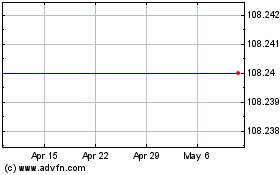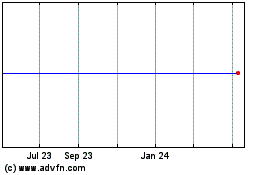Data shared at the 13th Congress of ECCO
Phase III program with OTEZLA (apremilast) in
ulcerative colitis expected to begin in 2018
Celgene Corporation (NASDAQ:CELG) announced that data from a
randomized, placebo-controlled, multi-center, phase II clinical
trial of apremilast in patients with active ulcerative colitis who
had failed at least one conventional therapy but were naïve to
biologic therapy were presented in an oral session today at the
13th Congress of ECCO in Vienna (Abstract OP006, 3:30 p.m. CET).
The results showed that a higher proportion of patients taking
apremilast 30 mg twice daily (BID) achieved clinical remission
versus placebo (nominally significant, P<0.05). OTEZLA®
(apremilast) is Celgene’s oral selective inhibitor of
phosphodiesterase 4 (PDE4).
In the study, a total of 170 patients were randomized to
placebo, apremilast 40 mg BID or apremilast 30 mg BID. The primary
endpoint of the study was Total Mayo Score (TMS) clinical remission
at week 12 for the 40 mg BID arm. At week 12, TMS clinical
remission was achieved by 21.8 percent of patients in the
apremilast 40 mg BID arm (n=55) versus 13.8 percent in the placebo
group (n=58; P=non-significant (NS)). In the apremilast 30 mg BID
arm, 31.6 percent of patients (n=57) achieved clinical remission as
measured by TMS at week 12 versus 13.8 percent in the placebo group
(n=58; nominally significant, P<0.05).
“The achievement of clinical remission, which requires
endoscopic improvement of the mucosa, is a meaningful goal in the
treatment of ulcerative colitis,” said presenting author Silvio
Danese, M.D., Ph.D., Head of the Inflammatory Bowel Disease
Clinical and Research Center, Humanitas Research Hospital. “These
findings suggest apremilast, which improved the likelihood of
achieving remission in this 12-week study, merits further study in
a larger trial.”
Clinical remission as measured by Partial Mayo Score (PMS), a
secondary endpoint, was achieved by 59.6 percent of patients in the
apremilast 30 mg BID arm versus 36.2 percent in the placebo arm
(nominally significant, P=0.0124) at week 12. PMS clinical
remission was also achieved by 52.7 percent of patients in the
apremilast 40 mg BID arm (P=NS versus placebo).
Additional secondary endpoints examined in the trial, including
endoscopic remission (Mayo Endoscopic Score ≤1), TMS clinical
response, serum biomarkers and mucosal healing (combined endoscopic
and histologic remission), showed clinically meaningful
improvements for apremilast 30 mg BID versus placebo.
“The strength of these data advances our plans to initiate a
phase III program for OTEZLA® (apremilast) 30 mg in ulcerative
colitis,” said Terrie Curran, President, Celgene Inflammation and
Immunology. “We remain committed to bringing forth innovative,
oral, immunomodulatory treatment options for patients with
inflammatory bowel disease.”
Treatment-emergent adverse events reported in at least 5 percent
of patients treated with apremilast included headache (23 percent
with apremilast 30 mg BID, 26 percent with apremilast 40 mg BID and
7 percent with placebo); viral upper respiratory tract infection (9
percent, 4 percent and 2 percent, respectively); nausea (5 percent,
11 percent and 9 percent); abdominal pain (5 percent, 2 percent and
2 percent); back pain (0 percent, 6 percent and 2 percent); and
asthenia (5 percent, 2 percent and 3 percent).
Apremilast is not approved for the treatment of ulcerative
colitis in any country. In January 2018, the U.S. Food and Drug
Administration designated apremilast an Orphan Drug for the
potential treatment of pediatric patients with ulcerative
colitis.
About Ulcerative Colitis
Ulcerative colitis is a chronic, relapsing condition triggered
by an abnormal, prolonged immune response that creates long-lasting
inflammation and ulcers (sores) in the mucosa (lining) of the large
intestine (colon). Symptoms usually develop over time, rather than
suddenly. The disease can be debilitating and can sometimes lead to
life-threatening complications. Ulcerative colitis is the most
common form of inflammatory bowel disease worldwide. About one in
every 198 people in Europe and one in every 402 people
in North America have ulcerative colitis. In 2004, 2.1 million
prescriptions were written to treat ulcerative colitis, and 716,000
ambulatory care visits were related to the disease. In 2010, there
were 107,000 hospitalizations due to ulcerative colitis.
About OTEZLA®
OTEZLA® (apremilast) 30 mg tablets is an oral small-molecule
inhibitor of phosphodiesterase 4 (PDE4) specific for cyclic
adenosine monophosphate (cAMP). PDE4 inhibition results in
increased intracellular cAMP levels, which is thought to indirectly
modulate the production of inflammatory mediators. The specific
mechanism(s) by which OTEZLA exerts its therapeutic action in
patients is not well defined.
U.S. PRESCRIBING INFORMATION
INDICATIONS
OTEZLA® (apremilast) is indicated for the treatment of patients
with moderate to severe plaque psoriasis who are candidates for
phototherapy or systemic therapy.
OTEZLA is indicated for the treatment of adult patients with
active psoriatic arthritis.
IMPORTANT SAFETY INFORMATION
Contraindications
OTEZLA® (apremilast) is contraindicated in patients with a known
hypersensitivity to apremilast or to any of the excipients in the
formulation
Warnings and Precautions
Diarrhea, Nausea and Vomiting: Cases of severe diarrhea, nausea,
and vomiting were associated with the use of OTEZLA. Most events
occurred within the first few weeks of treatment. In some cases,
patients were hospitalized. Patients 65 years of age or older and
patients taking medications that can lead to volume depletion or
hypotension may be at a higher risk of complications from severe
diarrhea, nausea, or vomiting. Monitor patients who are more
susceptible to complications of diarrhea or vomiting; advise
patients to contact their healthcare provider. Consider OTEZLA dose
reduction or suspension if patients develop severe diarrhea,
nausea, or vomiting
Depression: Carefully weigh the risks and benefits of treatment
with OTEZLA for patients with a history of depression and/or
suicidal thoughts/behavior, or in patients who develop such
symptoms while on OTEZLA. Patients, caregivers, and families should
be advised of the need to be alert for the emergence or worsening
of depression, suicidal thoughts or other mood changes, and they
should contact their healthcare provider if such changes occur
Psoriasis: Treatment with OTEZLA is
associated with an increase in depression. During clinical trials,
1.3% (12/920) of patients reported depression compared to 0.4%
(2/506) on placebo; Depression was reported as serious in 0.1%
(1/1308) of patients exposed to OTEZLA, compared to none in
placebo-treated patients (0/506). Suicidal behavior was observed in
0.1% (1/1308) of patients on OTEZLA, compared to 0.2% (1/506) on
placebo. One patient treated with OTEZLA attempted suicide; one
patient on placebo committed suicide
Psoriatic Arthritis: Treatment with
OTEZLA is associated with an increase in depression. During
clinical trials, 1.0% (10/998) reported depression or depressed
mood compared to 0.8% (4/495) treated with placebo. Suicidal
ideation and behavior was observed in 0.2% (3/1441) of patients on
OTEZLA, compared to none in placebo treated patients. Depression
was reported as serious in 0.2% (3/1441) of patients exposed to
OTEZLA, compared to none in placebo treated patients (0/495). Two
patients who received placebo committed suicide compared to none on
OTEZLA
Weight Decrease: Monitor body weight regularly; evaluate
unexplained or clinically significant weight loss, and consider
discontinuation of OTEZLA
Psoriasis: Body weight loss of
5-10% occurred in 12% (96/784) of patients treated with OTEZLA and
in 5% (19/382) of patients treated with placebo. Body weight loss
of ≥10% occurred in 2% (16/784) of patients treated with OTEZLA
compared to 1% (3/382) of patients treated with placebo
Psoriatic Arthritis: Body weight
loss of 5-10% was reported in 10% of patients taking OTEZLA and in
3.3% of patients taking placebo.
Drug Interactions: Apremilast exposure was decreased when OTEZLA
was co-administered with rifampin, a strong CYP450 enzyme inducer;
loss of OTEZLA efficacy may occur. Concomitant use of OTEZLA with
CYP450 enzyme inducers (e.g., rifampin, phenobarbital,
carbamazepine, phenytoin) is not recommended
Adverse Reactions
Psoriasis: Adverse reactions
reported in ≥5% of patients were (OTEZLA%, placebo%): diarrhea (17,
6), nausea (17, 7), upper respiratory tract infection (9, 6),
tension headache (8, 4), and headache (6, 4)
Psoriatic Arthritis: Adverse
reactions reported in at least 2% of patients taking OTEZLA, that
occurred at a frequency at least 1% higher than that observed in
patients taking placebo, for up to 16 weeks (after the initial
5-day titration), were (OTEZLA%, placebo%): diarrhea (7.7, 1.6);
nausea (8.9, 3.1); headache (5.9, 2.2); upper respiratory tract
infection (3.9, 1.8); vomiting (3.2, 0.4); nasopharyngitis (2.6,
1.6); upper abdominal pain (2.0, 0.2)
Use in Specific
Populations
Pregnancy and Nursing Mothers: OTEZLA is Pregnancy Category C;
it has not been studied in pregnant women. Use during pregnancy
only if the potential benefit justifies the potential risk to the
fetus. It is not known whether apremilast or its metabolites are
present in human milk. Caution should be exercised when OTEZLA is
administered to a nursing woman
Renal Impairment: OTEZLA dosage should be reduced in patients
with severe renal impairment (creatinine clearance less than 30
mL/min); for details, see Dosage and Administration, Section 2, in
the Full Prescribing Information
Please click here for Full Prescribing
Information.
About Celgene
Celgene Corporation, headquartered in Summit, New Jersey, is an
integrated global pharmaceutical company engaged primarily in the
discovery, development and commercialization of innovative
therapies for the treatment of cancer and inflammatory diseases
through next‐generation solutions in protein homeostasis,
immuno‐oncology, epigenetics, immunology and neuro‐inflammation.
For more information, please visit www.celgene.com. Follow
Celgene on Social Media: @Celgene, Pinterest, LinkedIn,
Facebook and YouTube.
Forward-Looking Statements
This press release contains forward-looking statements, which
are generally statements that are not historical facts.
Forward-looking statements can be identified by the words
“expects,” “anticipates,” “believes,” “intends,” “estimates,”
“plans,” “will,” “outlook” and similar expressions. Forward-looking
statements are based on management’s current plans, estimates,
assumptions and projections, and speak only as of the date they are
made. We undertake no obligation to update any forward-looking
statement in light of new information or future events, except as
otherwise required by law. Forward-looking statements involve
inherent risks and uncertainties, most of which are difficult to
predict and are generally beyond our control. Actual results or
outcomes may differ materially from those implied by the
forward-looking statements as a result of the impact of a number of
factors, many of which are discussed in more detail in our Annual
Report on Form 10-K and our other reports filed with the U.S.
Securities and Exchange Commission.
Hyperlinks are provided as a convenience and for informational
purposes only. Celgene bears no responsibility for the security or
content of external websites.
View source
version on businesswire.com: http://www.businesswire.com/news/home/20180215005279/en/
Investors:Patrick E. Flanigan III, 908-673-9969Corporate Vice
President, Investor RelationsorMedia:Catherine Cantone,
908-897-4256Senior Director, Corporate Communications
Celgene (NASDAQ:CELG)
Historical Stock Chart
From Oct 2024 to Nov 2024

Celgene (NASDAQ:CELG)
Historical Stock Chart
From Nov 2023 to Nov 2024
